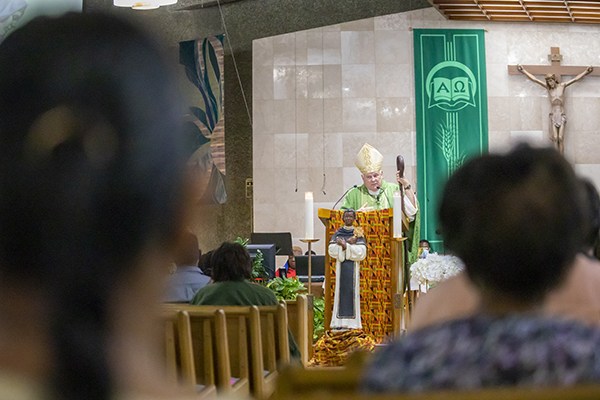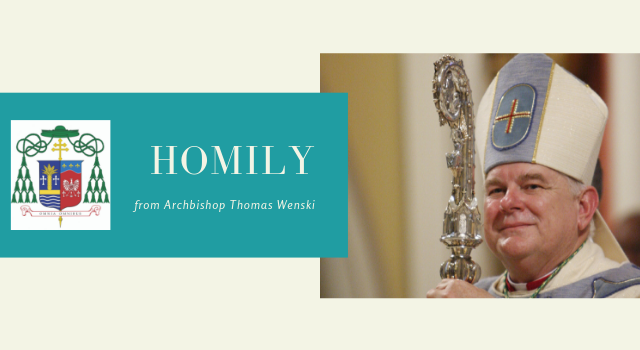By Archbishop Thomas Wenski - The Archdiocese of Miami
Archbishop Thomas Wenski preached this homily during a Mass to mark Black Catholic History Month, celebrated Nov. 6, 2021 at St. Bartholomew Church in Miramar.
Since 1990, at the initiative of the National Black Catholic Clergy Conference, November is observed as Black Catholic History Month. St. Martin de Porres’ feast day falls in November — and that’s one reason they chose November. Black Catholics have always been making history — but too often the contributions of Black Catholics have been overlooked and forgotten. St. Bartholomew is a great venue for this Mass in honor of Black Catholic History Month — because here there is great representation of the African diaspora: Nigerians, Haitians, Jamaicans, Bahamians, Barbadians, etc.
In the Gospel today, we see Jesus standing by the temple treasury. A good number of people give a lot, but the poor widow gives two small coins. But as Jesus observes she gave all she had. A couple of lessons could be drawn from this.

Photographer: JONATHAN MARTINEZ | FC
Archbishop Thomas Wenski preaches the homily during the Mass that marked the start of Black Catholic History Month, Nov. 6, 2021.
One lesson is that those who give a lot don’t necessary please God. They gave a lot — but out of their surplus, in other words, there was nothing of themselves in the gift, whereas the widow gave her very livelihood. So, perhaps what this Gospel passage is saying to us is that God doesn’t ask a lot of us; he asks everything of us. Like the story of the chicken and the pig that were asked to provide the farmer’s breakfast. The chicken only had to contribute an egg or two; but the pig ... well, to put bacon on the table required his total commitment.
But there’s another way of reading this Gospel story. Jesus strongly condemned the corruption of those in charge of the temple. You remember he drove the money changers out of the temple. And so perhaps in pointing out this poor widow to his disciples it wasn’t so much because he wanted to make her a hero but to underscore the fact that she was a victim. We all remember the Jim and Tammy Bakers, and those preachers of a health, wealth and prosperity gospel that distort Jesus’ message by telling people that Jesus will make them rich if only they send that $100 love offering to them. The widow goes hungry; the preachers go first class.
To build one’s faith in Jesus on the promise of prosperity is to build on sand. For faith in Jesus must be a faith in Jesus crucified. You cannot remove the cross from his message.
If we buy into this “health, wealth and prosperity” gospel, then inevitably we will undergo a crisis of faith when the cross intrudes into our lives. And the cross will intrude — whether through sickness, business failure or family crisis.
The lesson here is beware of those corrupt religious leaders who seek financial gifts from vulnerable people. In other words, Jesus is warning his disciples not to exploit the poor or the vulnerable but to take care of them.
The Word of God is inexhaustible in its meanings — so I think we can see the poor widow as a hero — or as a victim. Both interpretations can help us go deeper into what Jesus might be telling us today. Yes, we need total commitment to the Gospel and that total commitment demands that we involve ourselves in the cause of justice. The Gospel is not a drug to put us to sleep (as Karl Marx accused Christianity of being the opium of the people); the Gospel is leaven in the world. We are not to be of the world; but we are in the world to change the world.
This world is our highway to heaven — that highway needs to be straightened out, it needs to be paved, it needs good signage. That why we Christians — and, yes, we Catholics, must be involved in the world — because if we don’t take care of the potholes, we can break an axle, or without clear signage we can veer off course and get lost. Those who say we don’t care about this world don’t understand what Christianity is. An atheist believes we’re living on a dead-end street. Dead-end streets don’t require much maintenance or repair. But highways do.
In celebrating Black Catholic History Month, let’s remember some of the great pioneers in this community: Joe Lang Kershaw — who served in Tallahassee in the legislature for many years. Athalie Range, a long-time civic activist in Miami. She and her husband integrated the beaches here in South Florida in early 1960s. They helped build highways of justice because of their Catholic faith. But today we have Black Catholics of the caliber of Dr. Donald Edwards, assistant superintendent of Schools in the Archdiocese, Judge Marcia Cooke, a U.S. District Circuit Judge, and Tamara Lawson, dean of St. Thomas University’s School of Law. The faith informs their engagement in the world — and for the world.
Back to today’s Gospel. Don’t just contribute like the chicken; make a total commitment like the pig. And put your Catholic faith in action: protecting the vulnerable and taking care of the poor. That’s how we make straight that highway to heaven — for ourselves, and for our neighbors.

